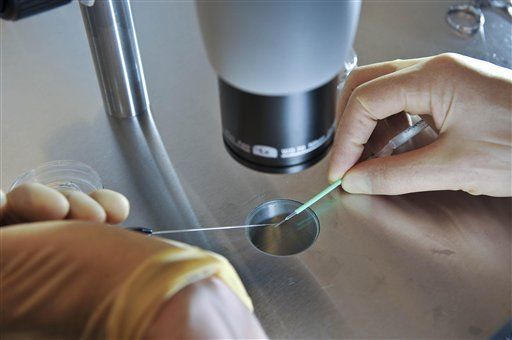PHOENIX т The stateтs high court has agreed to wade into the controversial issue of the rights of parties in a divorce to decide what happens to eggs they had fertilized т and whether one can be forced to become a parent against his or her will.
In a brief order Wednesday, the justices of the УлшжжБВЅ Supreme Court said they want to review whether the Court of Appeals properly interpreted a legal agreement about who gets to use the embryos when the now formerly married spouses cannot agree.
But the bigger issue could be whether the justices will direct courts handling such cases to balance the competing interests of the parties in deciding whether to let an embryo be implanted or ordering it donated to someone else т or even destroyed. That would put trial judges in the position of having to consider whether the argument of one person to bring the embryos to life can be outweighed by the argument of the other who does not.
People are also reading…
And that even could result in situations where a now-former spouse who did not want the embryos brought to term and does not now want to be a parent actually being legally responsible for child support.
Less clear is how much of a precedent will be set by the Supreme Court.
In 2018 т and in response to this case т the УлшжжБВЅ Legislature approved a law saying judges must grant viable embryos to whichever parent will allow them to be born, regardless of what a couple decided when first having an embryo frozen.
On paper, that means УлшжжБВЅ law now reads that a manтs decision to no longer be a parent can be overridden if his ex-wife wants to become a mother, using an embryo he helped to create. But it also means that a woman could wind up having no say as her former husband gives the frozen embryos to a new spouse who would give birth to a child who is biologically related to her.
The constitutionality of that new law, however, remains untested. And that leaves only this case for the justices to decide the questions of contracts, the rights of the biological parents т and whether the state can mandate parenthood on someone.
Court records show that Ruby Torres was diagnosed in 2014 with bilateral breast cancer, with her oncologist saying she would need to begin chemotherapy within a month. He also told her that treatment would impair her ability to get pregnancy. John Terrell, then her boyfriend, agreed to be the sperm donor for her eggs.
The couple married, but then subsequently divorced, with Terrell saying he did not want the frozen eggs to be used by Torres to have a child.
An agreement provided by Bloom Reproductive Institute, which handled the egg-fertilization procedure for the couple, said that embryos would be joint property of the two. Both had agreed to a provision that said in the case of divorce that it would be up to a judge to decide whether to allow the embryos to be used to achieve pregnancy or to donate it to another couple.
The trial judge ultimately directed the fertility clinic to donate any remaining embryos to a third party, concluding that Terrellтs тright not be to compelled to be a parent outweighed Torresт right to procreate and desire to have a biologically related child.т
Terrell got a trial judge to rule that Torres could not use their fertilized eggs. But the Court of Appeals, in a split ruling earlier this year, called that decision flawed.
On one hand, appellate Judge Jennifer Campbell, writing for the majority, acknowledged that the contract Torres and Terrell signed spells out that in the event of a separation or divorce the embryos could be used solely with the тexpress, written consentт of both parties. But she said that should not allow Terrell to use his veto power to stop the eggs from being used.
тApplying this approach invites individuals to hold hostage their ex-partnerтs ability to parent a biologically related child in order to punish or to gain other advantages,т she wrote. тWe decline to give one party a blanket veto.т
Campbell also said what weighs in favor of Torres is that she has a less than 1% chance of becoming pregnant by normal means and only a тremote possibilityт of adoption or insemination with a donor embryo.
The decision by the Supreme Court to review that ruling is not entirely a surprise: appellate Judge Maria Elena Cruz said the decision by her colleagues was legally wrong. She said the other two judges on the panel were ignoring a constitutional provision that says the state cannot interfere with contracts.
She agreed that the agreement the couple signed does have language leaving the fate of the embryos up to a trial judge.
But Cruz said that fails to recognize the mutual-consent requirement to use them.
тNothing in the agreement states that a court is free to disregard the other terms of the agreement when it decides the question,т she wrote. She also said Torres is not contesting the provision about the тexpress, written consent of both parties,т saying the majority has тwholly cast (that language) aside.т
On Twitter: @azcapmedia











